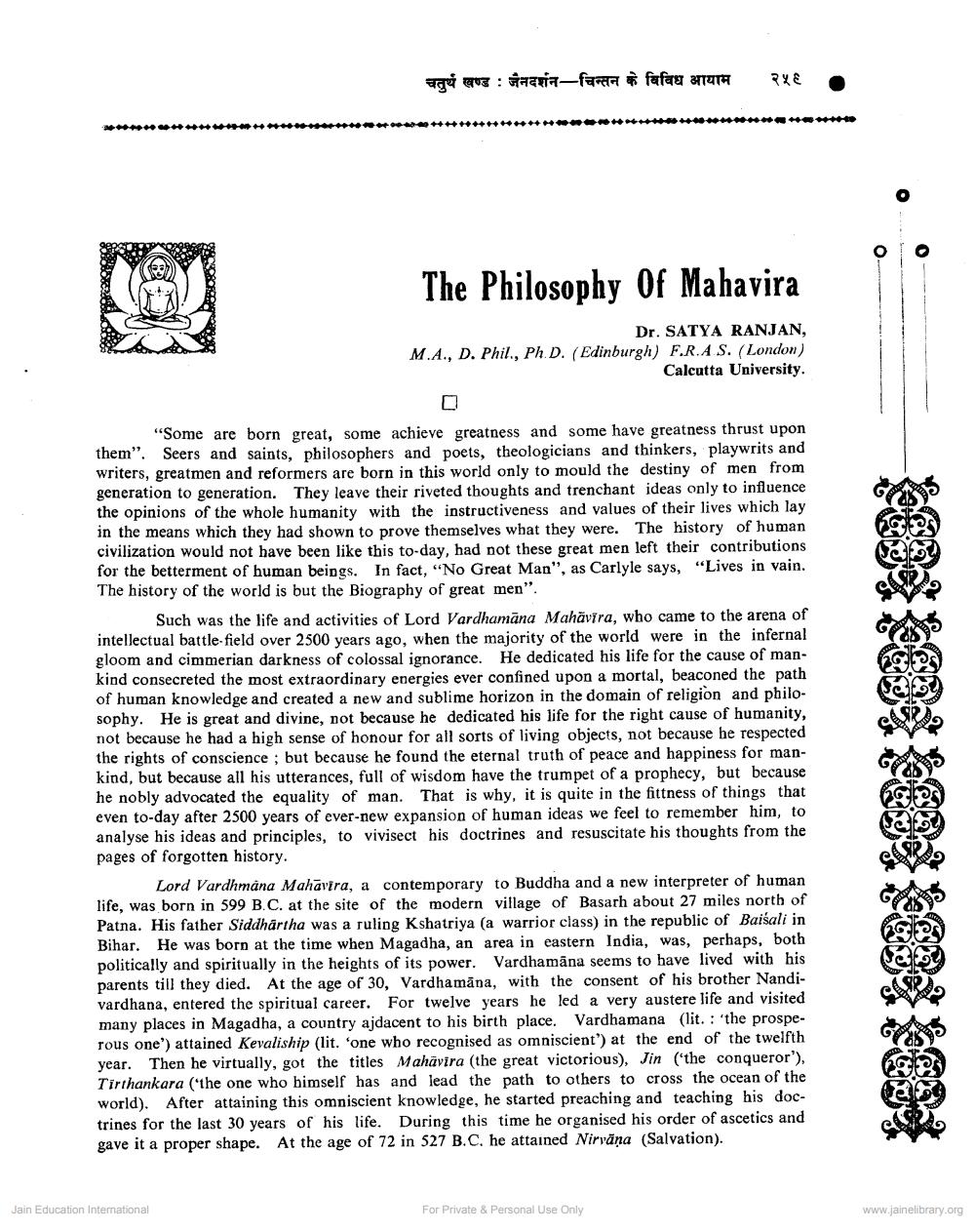Book Title: Philosophy of Mahavira Author(s): Satya Ranjan Publisher: Z_Pushkarmuni_Abhinandan_Granth_012012.pdf View full book textPage 1
________________ चतुर्थ खण्ड : जैनदर्शन-चिन्तन के विविध आयाम २५६ The Philosophy Of Mahavira Dr. SATYA RANJAN, M.A., D. Phil., Ph.D. (Edinburgh) F.R.AS. (London) Calcutta University. "Some are born great, some achieve greatness and some have greatness thrust upon them". Seers and saints, philosophers and poets, theologicians and thinkers, playwrits and writers, greatmen and reformers are born in this world only to mould the destiny of men from generation to generation. They leave their riveted thoughts and trenchant ideas only to influence the opinions of the whole humanity with the instructiveness and values of their lives which lay in the means which they had shown to prove themselves what they were. The history of human civilization would not have been like this to-day, had not these great men left their contributions for the betterment of human beings. In fact, "No Great Man", as Carlyle says, "Lives in vain. The history of the world is but the Biography of great men". Such was the life and activities of Lord Vardhamana Mahävira, who came to the arena of intellectual battle-field over 2500 years ago, when the majority of the world were in the infernal gloom and cimmerian darkness of colossal ignorance. He dedicated his life for the cause of mankind consecreted the most extraordinary energies ever confined upon a mortal, beaconed the path of human knowledge and created a new and sublime horizon in the domain of religion and philosophy. He is great and divine, not because he dedicated his life for the right cause of humanity, not because he had a high sense of honour for all sorts of living objects, not because he respected the rights of conscience; but because he found the eternal truth of peace and happiness for mankind, but because all his utterances, full of wisdom have the trumpet of a prophecy, but because he nobly advocated the equality of man. That is why, it is quite in the fittness of things that even to-day after 2500 years of ever-new expansion of human ideas we feel to remember him, to analyse his ideas and principles, to vivisect his doctrines and resuscitate his thoughts from the pages of forgotten history. Lord Vardhmana Mahavira, a contemporary to Buddha and a new interpreter of human life, was born in 599 B.C. at the site of the modern village of Basarh about 27 miles north of Patna. His father Siddhartha was a ruling Kshatriya (a warrior class) in the republic of Baisali in Bihar. He was born at the time when Magadha, an area in eastern India, was, perhaps, both politically and spiritually in the heights of its power. Vardhamāna seems to have lived with his parents till they died. At the age of 30, Vardhamana, with the consent of his brother Nandivardhana, entered the spiritual career. For twelve years he led a very austere life and visited many places in Magadha, a country ajdacent to his birth place. Vardhamana (lit. : 'the prosperous one') attained Kevaliship (lit. 'one who recognised as omniscient) at the end of the twelfth year. Then he virtually, got the titles Mahavira (the great victorious), Jin (“the conqueror), Tirthankara ("the one who himself has and lead the path to others to cross the ocean of the world). After attaining this omniscient knowledge, he started preaching and teaching his doctrines for the last 30 years of his life. During this time he organised his order of ascetics and gave it a proper shape. At the age of 72 in 527 B.C. he attained Nirvāņa (Salvation). Jain Education International For Private & Personal Use Only www.jainelibrary.orgPage Navigation
1 2 3
